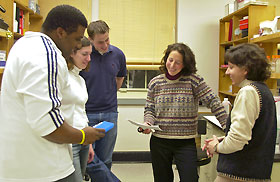DNA Fingerprinting And Civil Liberties
Focus Of New Course
 |
| From left, graduate students Craig O’Connor, Dawn Liscinsky, Dan Renstrom, and, far right, Betty Lawton, discuss forensics research with instructor Nancy Gifford, second from right, a former assistant U.S. prosecutor. |
|
Photo by Jordan Bender |
In Truro, Mass., DNA tests are currently being requested from the town’s 800 male inhabitants, as police search for the murderer who killed a fashion writer three years ago. The American Civil Liberties Union has called the DNA sweep an intrusion of privacy and has asked that it be stopped.
In Baton Rouge, La., in 2003, 1,200 white men were swabbed for DNA samples, as police looked for a serial killer based on a profile of a white man driving a white car. Eventually, an African-American was arrested and convicted, based on DNA collected at the crime scenes.
DNA dragnets and the use of fingerprint evidence are among the topics being examined in a new course in molecular and cell biology, “DNA Fingerprinting and Civil Liberties.”
Biological identifiers are used as tools by both defense attorneys and prosecutors, either to bolster or challenge a case.
Linda Strausbaugh, a professor of molecular and cell biology who initiated the course, says it is designed to encourage people who use biological evidence in law enforcement to think about the civil liberties implications.
In addition, she says, “cross training” is needed for members of the legal community and scientists to better understand one another’s issues. Aside from ethical and civil liberties issues, the new course will familiarize science students with legal procedures.
The idea for the course was suggested by two of Strausbaugh’s former Ph.D. students – Carll Ladd, now director of the DNA Unit for the state police laboratory, and Michael Bourke, director of CODIS (Combined DNA Index System) for the state lab. They came up with the idea after participating in a workshop on the subject at Harvard University’s John F. Kennedy School of Government.
Among the questions being raised in the seminar-style course are: From whom can or should the government require DNA samples? Should DNA samples be taken in the case of misdemeanors or felonies, and for which crimes? Should DNA be collected from everybody or only from people who have brushes with the law? How long should DNA information be kept?
Nancy V. Gifford, a former assistant U.S. prosecutor who teaches the course, says the increasing use of genetic material as evidence in legal cases requires that a balance be found between individual rights and the common good.
DNA evidence is “a tool for justice” in most cases, she says, but “it is very easy for this information to be abused.”
The issues the course confronts are surfacing more frequently in the courtroom, says Gifford, as the use of DNA evidence grows and statutes are passed about how genetic information can be used.
“The law is not static – it’s being challenged all the time.”
The issues are being raised not just about DNA fingerprinting, as DNA identification is called, but also about the more traditional inked-finger print.
In the past, a fingerprint identification from the FBI used to be considered definitive evidence that would clinch a case for the prosecution. Now, however, the accuracy of this method is increasingly open to question, Gifford says. Many defense attorneys are challenging fingerprint identifications in criminal cases, and prosecutors, too, have learned that a fingerprint no longer solves a case.
An example, Gifford told a recent class, was the arrest a year ago of an Oregon lawyer, Brandan Mayfield, as a material witness in the terrorist train bombing in Madrid. A convert to Muslim, Mayfield came under suspicion when the FBI said his fingerprint was a “bingo match” for a partial print found on a plastic bag of detonators in Madrid. After he was arrested and imprisoned, the print was found to belong to an Algerian man.
Many of the 20-plus students taking the course this semester are from the Professional Science Master’s in Applied Genomics program.
Eric Carita, a student in the class who received his professional science master’s in applied genomics in 2004, now works in the DNA unit of the Connecticut State Police Forensic Science Laboratory in Meriden. He has not yet had to testify in court, but he expects to do so soon.
“We do nothing like CSI,” he says, referring to the popular television series about forensic investigators. “We are science geeks who love genetics.”
Scientists who may have to testify in court need to be aware of the legal background, and also the level of scientific understanding of non-scientists, Gifford says.
“Anyone who’s seen [leading forensic scientist] Henry Lee in court has seen a master at translating science,” she tells the students. “You need to learn how to talk in court.”

